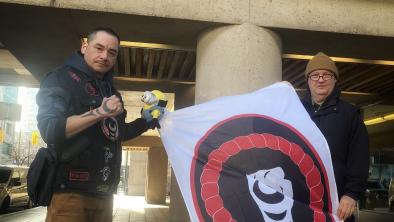B.C.’s public-sector pension invests millions in Enbridge, tobacco stock
Vancouver Sun
B.C.’s public-sector pensions are investing billions in Enbridge Inc. and other oil giants at the same time that public opinion in the province is strongly against projects such as Northern Gateway and the Alberta oilsands.
The B.C. Investment Management Corp. — the major investor of public pension funds — has $405.6 million invested in Enbridge, whose Northern Gateway project seeks to deliver bitumen from Alberta by pipeline to Kitimat to be exported by coastal tankers. A poll last month showed 60 per cent of British Columbians oppose the project.
BCIMC’s diversified portfolio also include $197.5 million in two British American Tobacco companies, $134 milllion in Philip Morris, $36.6 million in Imperial Tobacco, and $21.9 million in Japan Tobacco Inc., according to the corporation’s latest investment list dated March 31, 2012.
In 2011, the Alberta government directed the Alberta Investment Management Corp. to divest itself of ownership in tobacco companies, although tobacco remains in the portfolio of the Canada Pension Plan.
B.C. and other provinces are suing tobacco companies to recover the costs of tobacco-related health-care costs.
BCIMC has also invested close to $5 million in three Kinder Morgan companies. Kinder Morgan is seeking to twin its 1,150-kilometre pipeline to carry Alberta oilsands diluted bitumen to Burrard Inlet, requiring increased tanker shipments through Burrard Inlet.
Gwen-Ann Chittenden, manager of corporate initiatives for BCIMC, said in an interview on Thursday that the corporation has a “fiduciary obligation” to get the best return on its investments, even if that involves controversial companies and products.
“Our job is to deliver the returns that our clients require to fund their pensions,” she said from Victoria. “We do acknowledge that not all plan members will support every investment decision we make and will hold varying and conflicting views, but we have to prudently invest and do whatever we can to maximum the return ... within a given level of risk.
“Investing responsibly is not always about owning clean and green investments. It’s doing what we can to ensure the long-term financial status of the plans.”
(Employees of The Vancouver Sun and Province are among those whose pension investments include Enbridge bonds, Media Union president Mike Bocking confirmed.)
Chittenden noted that when BCIMC invests in a company, it has the potential to exert influence for the better, including by putting a representative on a board of directors. She encouraged individuals who are concerned about certain investments to raise the issue with their local pension board of trustees, who can then address the issue with BCIMC.
BCIMC represents the pension investments of more than 500,000 members of the public sector — including provincial and municipal employees, post-secondary institutions, health-care workers, police and firefighters, teachers, etc. It administered $92.1 billion in assets as of March 31, 2012, including insurance funds.
Bob Walker, a vice-president with NEI Ethical Funds in Vancouver, said it is difficult to avoid investing in energy companies given that they are such a major component of the Canadian corporate landscape.
“Investing in oil and gas and basic materials is a fact of life in Canada,” he said. “It’s pretty hard to escape. Our approach is to engage those sectors ... to improve performance. The saying is: ‘You can’t change a company you don’t own.’ It’s a more effective approach than avoidance.”
NEI draws the line at investing in nuclear power, tobacco companies, and certain military weapons such as landmines.
Walker noted that both NEI and BCIMC are signatories to the United Nations Principles for Responsible Investment, a global coalition representing more than 1,000 signatories and $30 trillion in assets under management.
Gwen Barlee of the Wilderness Committee called for a public groundswell to erase the “massive disconnect” that allows pension investments in areas such as the “dirty” Alberta oilsands.
Barlee said pension funds for the University of Victoria, which claims to be socially and environmentally progressive, have more than $4 million invested in Enbridge and more than $50 million in oilsands and other oil and gas producers and transporters,
“To say I am astounded is an understatement,” said Barlee, a UVic alumnus.
Last December, encouraged by 350.org (a U.S.-based group fighting investments in fossil-fuel companies, including by colleges and universities), Seattle Mayor Mike McGinn said he supported divesting from certain companies, including for city employee pension funds.
“That’s the right move,” Barlee said. “It sends an important moral message to society and to the markets — that these products that are part of the pension plan are not sustainable and are not green.”
Enbridge and Kinder Morgan are certainly not the only oil-industry companies that BCIMC has money in. Others include: $659.8 million in Suncor Energy, $381.1 million in TransCanada Corp., $317.3 million in Exxon Mobil Corp., $158.8 million in Royal Dutch Shell, $132.4 million in Encana Corp., $105 million in Crescent Point Energy Corp, and $98.2 million in BP PLC (the company involved in the 2010 Deepwater Horizon disaster in the Gulf of Mexico).
Others include: $96 million in Imperial Oil, $81.4 million in Husky Energy, $75.8 million in Occidental Petroleum Corp., $52.3 million in Anadarko Petroleum Corp., $36 million in Vermilion Energy Inc., $29.9 million in Pembina Pipeline Corp., $23.9 million in Tourmaline Oil Corp., $20.3 million in Duke Energy Corp.
BCIMC also holds equity investment in weapons manufacturers BAE Systems ($11 million), General Dynamics ($15.7 million), and Lockheed Martin ($16.3 million).


